A key focus for I-TECH in Ukraine is strengthening the capacity of local partners to develop and deliver high-quality clinical trainings and expand the supply of skilled health care workers.
Category: Human Resources for Health
Workforce Development in Haiti
It is critical that health care providers receive the necessary training to empower them to improve patient outcomes CHARESS supports both pre-service and in-service training efforts in Haiti. In particular, CHARESS is a key partner of MSPP in maintaining its national clinical guidelines. Continue reading “Workforce Development in Haiti”
Nancy Puttkammer

Nancy Puttkammer is an Acting Assistant Professor within the Department of Global Health at University of Washington and is the faculty co-lead of the Digital Initiatives Group at I-TECH (DIGI). Her interests are in strengthening health information systems and promoting data use and for quality improvement of health programs in resource-limited settings. She is trained as a health services researcher, specializing in using observational, routinely-collected data from electronic medical records (EMRs) to strengthen HIV care and treatment programs.
In her capacity as a Research and Evaluation Advisor at the International Training and Education Center for Health, Dr. Puttkammer works with informatics and training projects in Haiti, Kenya, and South Africa to improve large-scale implementation of EMRs, evaluate data quality and data use, support data analyses, and develop capacity for data use and implementation science research among colleagues and counterparts. Dr. Puttkammer has a PhD in Health Services from the University of Washington and an MPH in Community Health Education from the University of California, Berkeley.
Program Highlights
Scott Barnhart
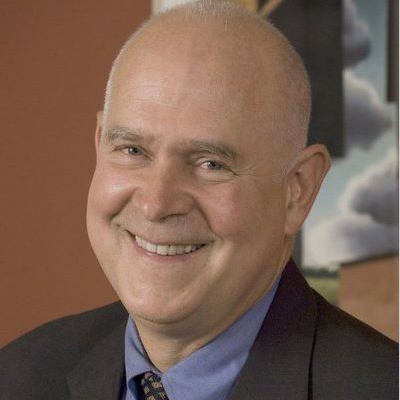
Scott Barnhart, MD, MPH, has an extensive background as Professor of Global Health and former Director of Global Health Programs for I-TECH at the University of Washington. He has had responsibility for leading nine country offices, projects in 14 countries, and more than 500 staff. This experience and training has included extensive clinical work, research and program management in pulmonary and environmental and occupational medicine, and more than eight years as Medical Director of a safety net/Level 1 Trauma Center hospital.
Ensuring health systems can quickly detect and respond to emerging health threats is a critical challenge in both domestic and global health. Dr. Barnhart’s major implementation projects include scale-up of voluntary medical male circumcision (VMMC) in Zimbabwe and Malawi, OpenMRS, and laboratory information systems. Dr. Barnhart deploys his expertise in multiple African countries and Haiti to strengthen health systems and health care.
A goal of Dr. Barnhart’s work is to promote country-led, country owned sustainable development. Consistent with the principles of the Paris Declaration, the goal is to transition the bulk of development work and the associated leadership, ownership, technical direction and control of funding into the countries where development occurs. This approach ensures that the entire continuum of skills necessary for development (technical expertise, administration (human resources, operations, and management and accountability for funds) is transitioned to local partners. A key indicator is to have 75% or more of a grant’s funding expended in-country on local programs and local citizens and to support the local economies in these highly resourced constrained countries. Dr. Barnhart has worked closely to advance this model through projects in Haiti with a goal to shift the majority of a project to a local organization and in Zimbabwe where the VMMC program is largely run through local partners.
Program Highlights
Health Information Systems in Haiti
Electronic medical record (EMR) systems have the capacity to improve clinical decision making and quality of care at site level but can also be leveraged to make data-driven, population-level public health decisions. At the request of the MSPP Continue reading “Health Information Systems in Haiti”
Clinical Mentoring in Haiti
I-TECH introduced its clinical mentoring program in Haiti in 2006. A team of physicians, nurses, and psychologists provide technical assistance to 20 sites in the MSPP care and services network to help strengthen HIV- and AIDS-related services. During site visits, CHARESS mentors conduct clinical rounds Continue reading “Clinical Mentoring in Haiti”
I-TECH Ukraine Conducts ARVs for Epidemic Control Workshop
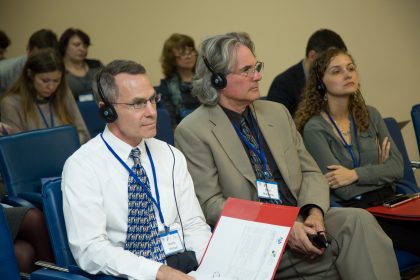
In early April, the International Training and Education Center for Health (I-TECH) conducted a five-day workshop on “Antiretroviral Drugs for Epidemic Control” for more than 50 chief doctors and deputy chief doctors from Regional AIDS Centers in Ukraine.
Workshop participants learned about evidence-based, international best clinical practices and the cost-effectiveness of strategies for using antiretroviral therapy (ART) to control HIV epidemics. International keynote speakers included:
- Dr. Jeremy Penner, International Clinical Advisor in Ukraine to I-TECH/University of Washington (UW);
- Dr. Elliot Marseille, Consultant to I-TECH/UW and the Center for Global Surgical Studies at the University of California, San Francisco;
- Dr. Michael Martin, U.S. Centers for Disease Control and Prevention (CDC) Senior Technical Advisor for HIV/AIDS care and treatment in Thailand; and
- Dr. Juliana de Fatima da Silva, Epidemic Intelligence Service Officer at the CDC.
The pool of facilitators also included nine national experts from the Ministry of Health’s Center of Public Health (CPH).
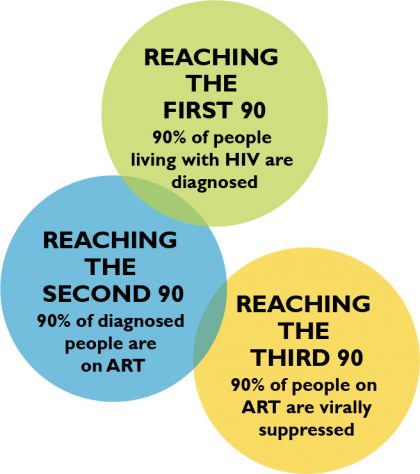 The workshop aimed to support the development of efficient strategies to achieve the UNAIDS 90-90-90 goals: 90% of HIV-positive people know their status, 90% of those are on treatment, and 90% of those are virally suppressed. To this end, the workshop covered national situational analysis, national clinical recommendations, and service delivery models with the highest potential for adaption in country.
The workshop aimed to support the development of efficient strategies to achieve the UNAIDS 90-90-90 goals: 90% of HIV-positive people know their status, 90% of those are on treatment, and 90% of those are virally suppressed. To this end, the workshop covered national situational analysis, national clinical recommendations, and service delivery models with the highest potential for adaption in country.
Progress on ART optimization in Ukraine was shared, and participants were able to discuss their experiences and ideas for improving HIV-related services. The presentations and group discussions were particularly timely, given the development of complex new HIV clinical guidelines currently under way in Ukraine – they also provided much needed evidence to support this process.
Similar workshops were requested by the CPH and leaders of the Regional AIDS Centers, and I-TECH plans to meet this request by conducting two workshops in June and September 2017.
THIS PROJECT IS SUPPORTED BY THE HEALTH RESOURCES AND SERVICES ADMINISTRATION (HRSA) OF THE U.S. DEPARTMENT OF HEALTH AND HUMAN SERVICES (HHS) UNDER U91HA06801, THE INTERNATIONAL AIDS EDUCATION AND TRAINING CENTER (IAETC). THE CONTENT OF THIS POST IS THE AUTHOR’S AND SHOULD NOT BE CONSTRUED AS THE OFFICIAL POSITION OR POLICY OF, NOR SHOULD ANY ENDORSEMENTS BE INFERRED BY HRSA, HHS OR THE U.S. GOVERNMENT.
D.C. Study Tour to Inform Continuing Medical Education in Ukraine

Ukraine has the second largest HIV epidemic in eastern and central Europe; an estimated 220,000 citizens were living with the disease as of January 2016. As part of national efforts to help curb the impact and spread of HIV, the Ukrainian government is expanding and scaling up HIV services – training is an integral part of this scale-up.
To this end, the International Training and Education Center for Health (I-TECH) is working with national partners in Ukraine to build local capacity to provide high-quality continuing medical education (CME) on HIV and related topics.
Most recently, I-TECH arranged for representatives from the Ukrainian Center for Socially Dangerous Disease Control (UCDC) of the Ministry of Health and the Ukrainian Family Medicine Training Center, based at Bogomolets National Medical University, to participate in a weeklong study tour in Washington, D.C.
“Participants found the study tour to be extremely informative and timely given reforms to health workforce development currently under way in Ukraine,” said Anna Shapoval, I-TECH Ukraine Country Representative. “The information obtained and contacts established through the study tour will help to inform development of an HIV-focused professional medical association in Ukraine.”
The aim of the association will be to advocate on behalf of medical providers, educate health professionals on new developments in clinical practice and relevant legislation and other issues affecting HIV medicine and patients, and potentially provide crucial CME opportunities.
Tour participants met with representatives from CME training networks, HIV-focused professional medical associations, and organizations involved with CME accreditation and physician licensure in the U.S. Highlights from the tour include:
- Meeting with the U.S. Human Resources and Services Administration (HRSA) on HRSA’s mission and activities, including the AIDS Education Training Center Program and other initiatives to improve HIV services in the U.S.
- Informative sessions with the Maryland State Board of Physicians and Federation of State Medical Boards on the role of state medical boards in physician licensure
- An overview and discussion on CME accreditation requirements and standards for commercial support
- Meetings with various HIV-focused professional medical associations to discuss their establishment, funding models, advocacy work, CME and certification offerings, and lessons learned
The study tour participants identified several aspects of the U.S. CME and licensure systems to explore further and potentially apply in Ukraine, including decentralized licensure, nongovernmental CME accreditation, and diverse CME providers such as universities and professional associations.
This project is supported by the Health Resources and Services Administration (HRSA) of the U.S. Department of Health and Human Services (HHS) under U91HA06801, the International AIDS Education and Training Center (IAETC). The content of this post is the author’s and should not be construed as the official position or policy of, nor should any endorsements be inferred by HRSA, HHS or the U.S. Government.
The Dogg Vows to “Get the Smart Cut”


Namibian newspaper New Era reported today that hip hop artist The Dogg (real name Martin Morocky) has agreed to be circumcised next month by Dr. Bernard Haufiku, Namibia’s Minister of Health and Social Services, as part of the country’s voluntary medical male circumcision (VMMC) program. The procedure is to take place on Minister Haufiku’s birthday, Sept. 19.
The International Training and Education Center for Health (I-TECH), with PEPFAR funding, has supported the VMMC efforts of the Ministry of Health and Social Services (MOHSS) in the Oshana and Zambezi regions on many fronts. Between 2010 and 2014, I-TECH supported health care worker training in the provision of VMMC nationwide and has supported the delivery of VMMC procedures since November 2014. Since the start of this year, I-TECH has also been engaged in critical efforts to create demand for the procedure.
Marocky, who lost both of his parents to HIV/AIDS, was previously involved in the MOHSS’s “Break the Chain” campaign to reduce concurrent sexual partnerships in Namibia. He’s been a VMMC ambassador since May 2016, serving as the face behind a nationwide concert and social media campaign urging 15- to 49-year-old men to “get the smart cut.”
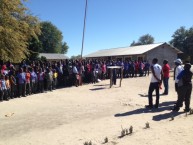
So far, Marocky has held nine concerts in the Erongo, Oshana, and Zambezi regions, as well as delivered encouragement to young men through radio talk shows and TV advertisements. He has also spoken one-on-one to young men about the preventive benefits of VMMC — namely, that the procedure can reduce the risk of HIV infection by more than 60%.
“I’ve encouraged ‘the smart cut’ through my music and appearances,” said Marocky. “But I’m now looking forward to protecting myself and setting a personal example for young Namibian men.”
The musician will join the more than 11,200 men in Oshana who have undergone a VMMC since 2009. More than 80% of the 12,250-plus procedures performed with I-TECH support since January 2015 are in the high-priority 15- to 29-year-old age group.
Currently, only about a quarter of Namibian men are circumcised. Overcoming cultural hurdles and mobilizing men to get the procedure has become a high priority for the MOHSS.
“Training clinicians in the procedure is only half the battle,” said I-TECH Namibia Country Director Norbert Forster. “Getting the word out to young men about the benefits of VMMC is crucial to ensuring the success of this intervention. The Dogg’s campaign has gone a long way toward changing minds and attitudes.”
The MOHSS and I-TECH are jointly engaging in a number of additional demand generation activities, which mainly focus on school-aged boys and young working men. One such activity, a bicycle lottery, is highlighted below.
Community Members Win Bicycle Lottery After Volunteering for VMMC
The MOHSS, with the support of I-TECH, has awarded the first two winners of new bicycles in a lottery held at Katima Mulilo State Hospital in the Zambezi Region.
The lottery was implemented to encourage more men to come in for VMMC; Zambezi remains the region most affected by HIV/AIDS in Namibia.
The first winner is an NDF soldier. His winning ticket was drawn out of the first group of men who were circumcised between March 1 and April 30, 2016, in the Zambezi region. The second winner, drawn from the May to July cohort, was a 16-year-old attending Mavuluma Senior Secondary School, a remote school in eastern Zambezi region.
During June of this year, the MOHSS Zambezi region team managed to mobilize and circumcise a total of 773 men as part of its I-TECH-supported VMMC program. The vast majority of recipients were between 15 and 29 years of age.
This project was supported by the Health Resources and Services Administration (HRSA) of the U.S. Department of Health and Human Services (HHS) under U91HA06801, the International AIDS Education and Training Center (IAETC). The content of this post is the author’s and should not be construed as the official position or policy of, nor should any endorsements be inferred by HRSA, HHS or the U.S. Government.
Facilitator’s Guide Breaks New Ground in Ukraine
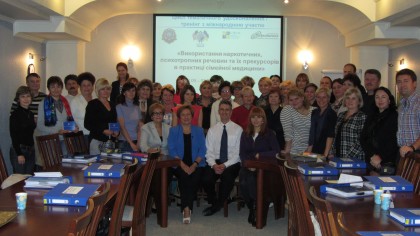
In June 2016, the academic and professional communities involved in training family physicians and general practitioners in Ukraine received another valuable guide to a highly sensitive topic.
The International Training and Education Center for Health (I-TECH) in Ukraine, the Ukrainian Family Medicine Training Center (UFMTC) at the Bogomolets National Medical University (NMU), and the International Renaissance Foundation, all under the auspices of the Ministry of Health (MoH) of Ukraine, published “Use of Narcotic, Psychotropic Substances and their Precursors in the Practice of Family Medicine.” This facilitator’s guide (published in Ukrainian) was developed by Ukrainian and international experts in the fields of palliative care, controlled drug use, and pain management.
“The uniqueness of this publication is its extremely topical and, until recently, understated issue in Ukraine: provision of medical care with the use of controlled drugs, including opioid analgetics,” said Kateryna Amosova, Rector of the Bogomolets NMU.
The guide incorporates recent, groundbreaking updates in Ukrainian legislation. Resolution #333 of the Cabinet of Ministers of Ukraine and Order #494 of the MoH legitimize primary health care providers to prescribe and manage opioids for pain management in palliative care and opioid substitution therapy (OST).
“I-TECH Ukraine was honored to be able contribute to the development of the in-service training course that promotes most progressive principles of palliative care and OST provision for patients, including those with HIV, tuberculosis, and other HIV-associated diseases,” said Anna Shapoval, Country Representative for I-TECH Ukraine. “As always, we express our profound gratitude to the Ministry of Health of Ukraine, HRSA of the U.S. Department of Health and Human Services, CDC in Ukraine, and the International Renaissance Foundation for supporting this project.”
The goal of this training curriculum is to provide participants with the skills and knowledge required to form competencies in applying narcotic, psychotropic substances, and their precursors in the practice of family medicine, specifically in combination with treatment of drug addiction, tuberculosis, and hepatitis.

The guide is based on the results of three pilot training events that took place in October through December 2015 in Uzhgorod and Kyiv. Dr. Chris Behrens, Clinical Associate Professor in the University of Washington’s Department of Global Health, co-facilitated the first event in Uzhgorod. Dr. Behrens also co-authored the guide, along with leading experts from the Bogomolets NMU, the Ministry of Internal Affairs of Ukraine, the National Police of Ukraine, the State Service of Ukraine for the Drug Use Control, the Ivano-Frankivsk Oblast Clinical Center for Palliative Care, the Kyiv and Kryvyi Rih City AIDS Centers, and the International Renaissance Foundation.
The course covers such essential themes as:
- The role of family physicians and primary health care facilities in using narcotic and psychotropic drugs and their precursors;
- Legal and organizational principles of applying narcotic and psychotropic drugs and their precursors in primary health care practice in Ukraine;
- Mental health; pre-conditions and types of opioid addiction; HIV/AIDS and other infectious diseases in IDUs; palliative and hospice care;
- Principles and use of opioid maintenance therapy in primary health care, including the patients living with HIV/AIDS; and
- Principles and use of narcotic and psychotropic drugs and their precursors in provision of palliative and hospice care, including patients living with HIV/AIDS.
The MoH of Ukraine recommends this guide as a tutorial for clinical interns and doctors enrolled in in-service or continuous medical education training programs, as well as for faculty of the Ukrainian medical universities and colleges that train doctors and nurses as general practitioners and family doctors. The guide has been already disseminated to about 60 medical universities and the largest medical colleges in Ukraine.